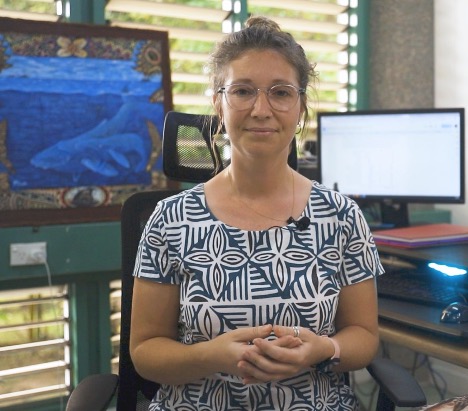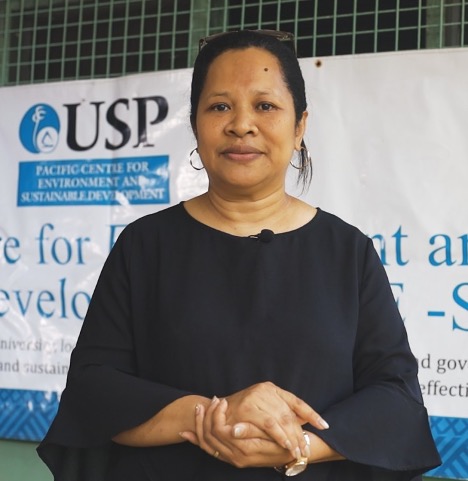THE University of the South Pacific (USP) is playing a crucial role towards mitigating the effects of climate change in the region and the promotion of the United Nations Sustainable Development Goals (UN SDGs) and advancement of women in Science, Technology, Engineering and Mathematics (STEM).
This was highlighted by the USP Vice Chancellor Professor Pal Ahwalia in his speech at the USP Solomon Islands Campus 2024 graduation ceremony on Friday.
The graduation ceremony convened at the Friendship Hall near the USP Campus saw 229 students graduate with certificates, diplomas and degrees in various disciplines.
Professor Ahwalia said, “USP has been a bedrock of regionalism for over 56 years and will continue to remain true to the vision and foresight of those who established our institution. It stands proud and tall on the shoulders of giants. Our forbearers’ vision has weaved USP into the Pacific’s manna.
“USP plays a crucial role in advancing development in the Pacific region through several key initiatives and strategies.

“It contributes significantly to the socioeconomic and cultural development of the Pacific region, preparing it to meet current and future challenges,” he said.
He told the gathering that he was in Tonga in August to attend the 53rd Pacific Islands Forum Leaders Meeting and had the opportunity to brief the regional leaders of USP’s flagship initiatives that will bolster the region’s fight against climate change and address ocean management issues through its newly launched Centre for Sustainable Futures at USP itself.
Professor Ahwalia said, everyone knows that climate change is the single greatest existential threat to the Pacific region and USP saw the need and opportunity to leverage its position, complementing other regional initiatives and around climate change and oceans management in collaboration and in sync with its fellow CROP agencies. CROP stands for Council of Regional Organizations of the Pacific.
“Through its structured approach and collaborations with stakeholders, this new center will contribute to improved institutional capability and evidence-based decision making in the Pacific region, fostering climate resilience and driving ambitious and innovative actions on climate change.

“The center will become a central hub for climate change research and collaboration and create a multi-disciplinary integrated and strategic approach to climate change resilience and oceans management,” he said.
Professor Ahwalia said with an initial funding of NZD15m from the New Zealand Ministry of Foreign Affairs and Trade, USP will ensure its sustainability and long-term impact for all our Pacific Island Countries.
He said whilst continuing to focus on national and regional issues through learning, teaching and research, it is encouraging to know that USP was once again ranked amongst the top universities in the 2024 Times Higher Education (THE) World Impact Rankings and the main rankings.
“This reemphasizes our commitment and work aligned to the United Nations Sustainable Development Goals. We were also ranked in the World University ranking for innovation and we were amongst the top 300 global innovative universities in the world.
“That’s a remarkable achievement, absolutely remarkable. Our international rankings are testament to the hard work, determination and team work of all our staff and students and I’m very proud of this fact and acknowledge everyone who continues to contribute to our global recognition.”

Professor Ahwalia also took the opportunity to highlight the strategic initiative of the USP to commemorate the International Women’s Day’s 2024 – USP Women in Academic Leadership program, which supports women at USP on the threshold of academic promotion by providing them time to focus entirely on their research and publications.
He added that USP has recently identified three women who have been successful in this year’s cohort and it is confident these numbers will continue to grow in the coming years. The three women are Dr Amanda Ford, Dr Buriata Tofinga and Dr Hilda Waqa-Sakiti.
“Given that our institution has produced more female graduates throughout the success years, an average of 60 percent of those who graduated over the last six years is female. We want to see more women play leading roles in such spaces and we just have to look at the crowd and the graduates before us to realize that even this graduation replicates those numbers.
“With the support of my senior management team, I’m excited to see our programs and initiatives around women and girls in STEM (Science, Tech, Engineering and Mathematics grow. USP has been undertaking critical work in championing gender-equality and the advancement of women in fields such as science, technology, engineering and mathematics.”
Professor Ahwalia earlier highlighted these crucial roles played by USP towards mitigating the effects of climate change in the region and the promotion of the United Nations Sustainable Development Goals (UN SDGs) and advancement of women in STEM at the opening of the USP Solomon Islands Campus last Thursday.
By IAN LADDS OSO
Solomon Star, Honiara









